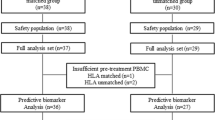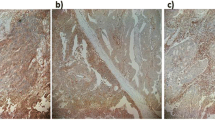Abstract
Introduction
Most cancer vaccination trials have been performed in human leukocyte antigen (HLA)-A2 positive populations. Some studies have used HLA-A2 negative patients as control group. However, HLA-type and HLA-expression can interact with tumor biology and possibly affect prognosis. HLA-A2 negative patients might constitute an inadequate control group.
Materials and methods
Patients with colorectal cancer were serologically analyzed for HLA-A2 expression. Patients were evaluated for tumor stage, grading, tumor location. Overall survival (OAS) of HLA-A2 positive and HLA-A2 negative patients was compared.
Results
One hundred forty-four patients were evaluable (50% HLA-A2+). Median age was 62 years. UICC stage III or IV: 45.8%. Gender, location, and UICC stage were equally distributed between HLA-A2 subgroups. HLA-A2 positive patients more frequently had grade 3 histology (27.8% vs 13.9%) and chemotherapy (62.9% vs 45.6%). At a median follow-up of 75.8 months, median OAS for the entire study population was 123.3 months, 5-year OAS was 77.5%. No statistically significant difference in OAS was observed between HLA-A2 positive and negative patients (116.5 vs 157 months, 5-year-OAS 74.1 ± 11.6% vs 81 ± 11.6%, p = 0.46). Expectedly, patients with UICC stage I and II disease lived significantly longer than patients with stage III and IV (5-year OAS 94.3% vs 53.4%; p < 0.001). A significantly superior OAS was also found for women, independent of stage or HLA status.
Conclusion
HLA-A2 positive patients exhibit poorer tumor differentiation. This might account for a non-significant difference in OAS. The use of HLA-A2 negative patients as control cohort in CRC vaccinations would rather underestimate potential treatment-related survival effects. Therefore, we suggest they constitute a valid auxiliary control group.


Similar content being viewed by others
Abbreviations
- CRC:
-
colorectal cancer
- DC:
-
dendritic cells
- HLA:
-
human leukocyte antigen
- TAA:
-
tumor associated antigen
- NPC:
-
nasopharyngeal carcinoma
References
Provenzano M, Panelli MC, Mocellin S, Bracci L, Sais G, Stroncek DF, Spagnoli GC, Marincola FM (2006) MHC-peptide specificity and T-cell epitope mapping: where immunotherapy starts. Trends Mol Med 12:465–472
Dudley ME, Wunderlich JR, Yang JC, Sherry RM, Topalian SL, Restifo NP, Royal RE, Kammula U, White DE, Mavroukakis SA, Rogers LJ, Gracia GJ, Jones SA, Mangiameli DP, Pelletier MM, Gea-Banacloche J, Robinson MR, Berman DM, Filie AC, Abati A, Rosenberg SA (2005) Adoptive cell transfer therapy following non-myeloablative but lymphodepleting chemotherapy for the treatment of patients with refractory metastatic melanoma. J Clin Oncol 23:2346–2357
Scheibenbogen C, Letsch A, Schmittel A, Asemissen AM, Thiel E, Keilholz U (2003) Rational peptide-based tumour vaccine development and T cell monitoring. Semin Cancer Biol 13:423–429
Nagorsen D, Thiel E (2006) Clinical and immunologic responses to active specific cancer vaccines in human colorectal cancer. Clin Cancer Res 12:3064–3069
Mosolits S, Ullenhag G, Mellstedt H (2005) Therapeutic vaccination in patients with gastrointestinal malignancies. A review of immunological and clinical results. Ann Oncol 16:847–862
Peoples GE, Gurney JM, Hueman MT, Woll MM, Ryan GB, Storrer CE, Fisher C, Shriver CD, Ioannides CG, Ponniah S (2005) Clinical trial results of a HER2/neu (E75) vaccine to prevent recurrence in high-risk breast cancer patients. J Clin Oncol 23:7536–7545
Hueman MT, Dehqanzada ZA, Novak TE, Gurney JM, Woll MM, Ryan GB, Storrer CE, Fisher C, McLeod DG, Ioannides CG, Ponniah S, Peoples GE (2005) Phase I clinical trial of a HER-2/neu peptide (E75) vaccine for the prevention of prostate-specific antigen recurrence in high-risk prostate cancer patients. Clin Cancer Res 11:7470–7479
Kubler K, Arndt PF, Wardelmann F, Krebs D, Kuhn W, van der Ven K (2006) HLA-class II haplotype associations with ovarian cancer. Int J Cancer 119:2980–2985
Montova L, Saiz I, Rey G, Vela F, Clerici-Larradet N (1998) Cervical carcinoma: human papillomavirus infection and HLA-associated risk factors in the Spanish population. Eur J Immunogenet 25:329–337
Eivazi-Ziaei J, Dastgiri S, Majidi J, Vaez J, Asvadi I, Mahmoudpour A (2006) Human leukocyte antigen and esophageal cancer in the northwestern region of Iran. Dis Esophagus 19:238–240
Planelles D, Nagore E, Moret A, Botella-Estrada R, Vila E, Guillen C, Montoro JA (2006) HLA class II polymorphisms in Spanish melanoma patients: homozygosity for HLA-DQA1 locus can be a potential melanoma risk factor. Br J Dermatol 154:261–266
Fensterle J, Trefzer U, Berger T, Andersen MH, Ugurel S, Becker JC (2006) HLA-B8 association with late-stage melanoma—an immunological lesson? BMC Med 4:5
Gamzatova Z, Villabona L, Dahlgren L, Dalianis T, Nillson B, Bergfeldt K, Masucci GV (2006) Human leucocyte antigen (HLA) A2 as a negative clinical prognostic factor in patients with advanced ovarian cancer. Gynecol Oncol 103:145–150
Magnusson PKE, Enroth H, Eriksson I, Held M, Nyren O, Engstrand L, Hansson LE, Gyllensten UB (2001) Gastric cancer and human leukocyte antigen: distinct DQ and DR alleles are associated with development of gastric cancer and infection by Helicobacter pylori. Cancer Res 61:2684–2689
Ohmori M, Yasunaga S, Maehara Y, Sugimachi K, Sasazuki T (1997) DNA typing of HLA class I (HLA-A) and class II genes (HLA-DR, -DQ and -DP) in Japanese patients with gastric cancer. Tissue Antigens 50:277–282
Li Z, Chen D, Zhang C, Li Y, Cao B, Ning T, Zhao Y, You W, Ke Y (2005) HLA polymorphisms are associated with Helicobacter pylori infected gastric cancer in a high risk population, China. Immunogenetics 56:781–787
Lovig T, Andersen SN, Thorstensen L, Diep CB, Meling GI, Lothe RA, Rognum TO (2002) Strong HLA-DR expression in microsatellite stable carcinomas of the large bowel is associated with good prognosis. Br J Cancer 87:756–762
Yun HR, Lee WY, Lee OS, Cho YB, Yun SH, Chun HK (2007) The prognostic factors of stage IV colorectal cancer and assessment of proper treatment according to the patient’s status. Int J Colorectal Dis 22:1301–1310
Ju JH, Chang SC, Wang HS, Yang SH, Jiang JK, Chen WC, Lin TC, Hung Hsu, Wang FM, Lin JK (2007) Changes in disease pattern and treatment outcome of colorectal cancer: a review of 5,474 cases in 20 years. Int J Colorectal Dis 22:855–862
McArdle CS, McMillan DC, Hole DJ (2003) Male gender adversely affects survival following surgery for colorectal cancer. Br J Surg 90:711–715
Wichmann MW, Müller C, Hornung HM, Lau-Werner U, Schildberg FW, Colorectal Cancer Study Group (2001) Gender differences in long-term survival of patients with colorectal cancer. Br J Surg 88:1092–1098
Verschueren RC, Mulder NH, Van Loon AJ, De Ruiter AJ, Szabo BG (1997) The anatomical substrate for a difference in surgical approach to rectal cancer in male and female patients. Anticancer Res 17:637–641
Hildesheim A, Apple RJ, Chen CJ, Wang SS, Cheng YJ, Klitz W, Mack SJ, Chen IH, Hsu MM, Yang CS, Brinton LA, Levine PH, Erlich HA (2002) Association of HLA class I and II alleles and extended haplotypes with nasopharyngeal carcinoma in Taiwan. J Natl Cancer Inst 94:1780–1789
Acknowledgments
We thank Sandra Bauer, Susanne Wojtke, and the whole HLA-Lab team (particularly, Kristina Zuber, Nora Wendt, Sabrina Ballaschke, Kerstin Thomas) for excellent technical assistance.
This work was supported by the German Research Foundation (Deutsche Forschungsgemeinschaft, DFG NA 716/1-1).
Author information
Authors and Affiliations
Corresponding author
Rights and permissions
About this article
Cite this article
Kiewe, P., Mansmann, V., Scheibenbogen, C. et al. HLA-A2 expression, stage, and survival in colorectal cancer. Int J Colorectal Dis 23, 767–772 (2008). https://doi.org/10.1007/s00384-008-0488-y
Accepted:
Published:
Issue Date:
DOI: https://doi.org/10.1007/s00384-008-0488-y




